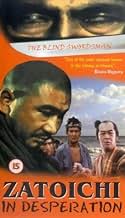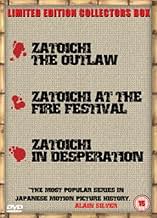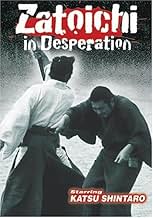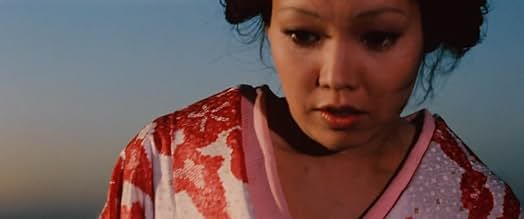La Légende de Zatoïchi : La blessure
Original title: Shin Zatôichi monogatari: Oreta tsue
IMDb RATING
6.8/10
1.2K
YOUR RATING
After accidentally causing an old lady's death, Zatoichi seeks out her daughter to atone for the tragedy, consequently getting into all sorts of trouble.After accidentally causing an old lady's death, Zatoichi seeks out her daughter to atone for the tragedy, consequently getting into all sorts of trouble.After accidentally causing an old lady's death, Zatoichi seeks out her daughter to atone for the tragedy, consequently getting into all sorts of trouble.
- Director
- Writers
- Stars
- Director
- Writers
- All cast & crew
- Production, box office & more at IMDbPro
Featured reviews
Katsu Productions was at a high level of output at this time. Katsu was producing the Zatoichi series, the Lone Wolf series, the Hanzo the Razor trilogy, the Mute Samurai television series and the Lone Wolf television series. All within a span of two years. In addition to acting in several of these efforts (of course) he also took the director's chair on several occasions. This man had a lot of energy.
While sometimes actors who take the helm show a lack of concern with the visuals preferring to focus on the performances, Katsu is an exception. The visual style here is unlike any other Zatoichi I've seen and in fact unlike most other chambara films. Everything is shot in deep focus with moody lighting and stark saturated colors. The style is somber and depressing. The next (and last in the series) Zatoichi film is back to the standard look. If you like this film I would suggest looking into Katsu's Oshi Samurai series which continues the atmosphere.
One of the best Zatoichi films but not similar to the others. Recommended but prepare for a somber experience.
While sometimes actors who take the helm show a lack of concern with the visuals preferring to focus on the performances, Katsu is an exception. The visual style here is unlike any other Zatoichi I've seen and in fact unlike most other chambara films. Everything is shot in deep focus with moody lighting and stark saturated colors. The style is somber and depressing. The next (and last in the series) Zatoichi film is back to the standard look. If you like this film I would suggest looking into Katsu's Oshi Samurai series which continues the atmosphere.
One of the best Zatoichi films but not similar to the others. Recommended but prepare for a somber experience.
I have not seen more than five of the classic (and undeniably classy) Zatoichi samurai films, but this is surely the best, cinematographically, so far. It;s hard to believe this was shot in Eastman Color, a kind of poor second to Technicolor (and with far less durability; either the negative was especially preserved, or digital restoration was performed by a true expert; but in any event, this film is absolutely gorgeous to look at.
The story is dark, as others have noted; but the Zatoichi series, like most of the sword-fight genre series films to come out of Japan, is pretty heavy-handed stuff; the Japanese seem to take this sort of thing very seriously. Yet there is no doubt Zatoichi "24" stands out as exceptional, from both the series and its genre. The reason, I think, is its almost total sense of social dislocation; Zatoichi is treated by the other characters as somehow less than human, and his determination to fight at the end somewhat more than human, and so he comes across as something other than human; but the other humans of the film come across as rather poor representatives of the species. I should note that there is very little dialog in this film, particularly at the most dramatic moments, which heightens our sense that we are watching some tragedy from another reality.
The question here is, has director/star Katsu pushed his character to such an extreme that he is no longer representative of his genre, but somehow an independent dramatic entity, a "grade-A film", as might be enjoyed by those who disdain genre-films? well, I suggest this film to such viewers, as the "one chambara (Japanese sword-fight)film to see". But in any event, it is an exceptional, and troubling, cinema experience for anyone.
The story is dark, as others have noted; but the Zatoichi series, like most of the sword-fight genre series films to come out of Japan, is pretty heavy-handed stuff; the Japanese seem to take this sort of thing very seriously. Yet there is no doubt Zatoichi "24" stands out as exceptional, from both the series and its genre. The reason, I think, is its almost total sense of social dislocation; Zatoichi is treated by the other characters as somehow less than human, and his determination to fight at the end somewhat more than human, and so he comes across as something other than human; but the other humans of the film come across as rather poor representatives of the species. I should note that there is very little dialog in this film, particularly at the most dramatic moments, which heightens our sense that we are watching some tragedy from another reality.
The question here is, has director/star Katsu pushed his character to such an extreme that he is no longer representative of his genre, but somehow an independent dramatic entity, a "grade-A film", as might be enjoyed by those who disdain genre-films? well, I suggest this film to such viewers, as the "one chambara (Japanese sword-fight)film to see". But in any event, it is an exceptional, and troubling, cinema experience for anyone.
I've seen 23 of the 26 films in the series (not including the Kitano) and this is by far the hardest to watch. It is less about Zatoichi and more about the cruelty and hardship of living in poverty in a fishing village in Edo era Japan. The film dwells very much upon the secondary characters as ends unto themselves and not just as elements in a story setting up a problem which Zatoichi will eventually resolve. Zatoichi acts as you would expect him to but he is overwhelmed by the misery and circumstances in a way that is unique in the series. Watch it by all means, but not with a light heart. I found myself also overwhelmed by the misery depicted in the film. It is unsettling.
'Zatoichi In Desperation' was the 24th movie in the long running and very popular martial arts series starring Shintaro Katsu as Zatoichi the blind master swordsman and masseur. Zatoichi, for those that don't know is a ronin (a wandering samurai), very quiet and unassuming with a wry sense of humour, but an absolute killing machine when crossed! In this episode he encounters an old woman while crossing a bridge, and after a brief conversation with her, she tragically falls to her death. Upset, Zatoichi sets off to a nearby town to look for the woman's daughter Nishikigi to break the news to her. He eventually finds her working as a geisha and learns she only needs to pay a debt of fifty ryo to buy her freedom. Zatoichi becomes obsessed with raising the money and in doing so ignores the hardships experienced by the local fisherman caused by the local evil boss Mangoro. But when Mangoro kidnaps Nishikigi everything comes to a head in a brutal climax, and Zatoichi must save her and his own life. I can't claim to be any kind of Zatoichi expert, but he's a most intriguing character, and Katsu plays the role masterfully. I highly recommend 'Zatoichi In Desperation'.
Zatoichi in Desperation is the most somber and darkest Zatoichi film that I have seen in the series, both in terms of photography and plot. It's interesting that Shintaro Katsu, who plays Zatoichi, was the director. He was certainly going for a different look and style and got it. Most of the scenes are darkly lit and there is a claustrophobic feeling to the shots. The bad guys, composed of the local yakuza (gangster) mob, are meaner than usual and the body count of innocent villagers is far higher than usual. Zatoichi himself also suffers more at the hands of the evil doers than usual. This was the next to last entry (#24) in the series before the 17 year hiatus between #25 and 26. Things get back into the more typical Zatoichi style in #25. This film would have been appropriate as the last in the series. It has the feeling of "an ending". A very interesting entry, but not one of my favorites. As always, recommended for Zatoichi fans.
Did you know
- TriviaOnly film in the original series directed by Zatoichi himself, Shintarô Katsu. He would go on to direct one more, La légende de Zatoïchi - L'odyssée finale (1989).
- Quotes
Boss Mangoro Kagiya: Please enjoy watching as Zatoichi meets his end.
- ConnectionsFollowed by Mang jian xue di zi (1973)
- How long is Zatoichi in Desperation?Powered by Alexa
Details
- Release date
- Country of origin
- Language
- Also known as
- Zatoichi in Desperation
- Production companies
- See more company credits at IMDbPro
- Runtime1 hour 35 minutes
- Sound mix
- Aspect ratio
- 2.35 : 1
Contribute to this page
Suggest an edit or add missing content

Top Gap
By what name was La Légende de Zatoïchi : La blessure (1972) officially released in India in English?
Answer





























